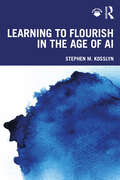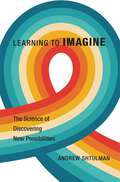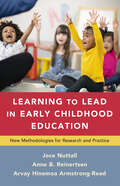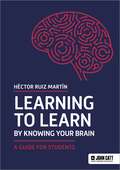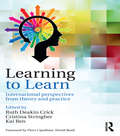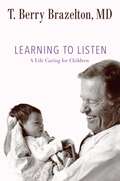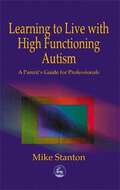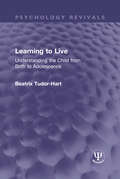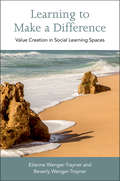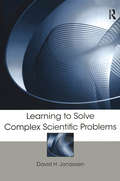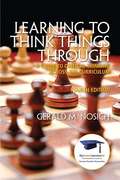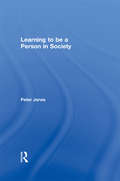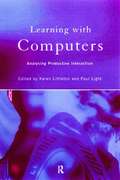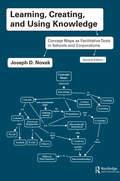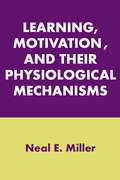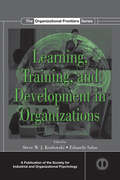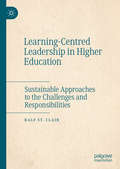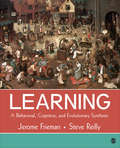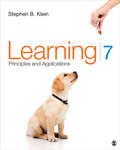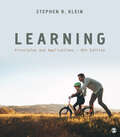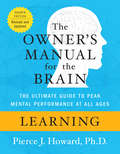- Table View
- List View
Learning to Flourish in the Age of AI
by Stephen M. KosslynThis timely book affirms that humans can flourish in the Age of AI by relying on their distinctive strengths, and explores the skills and knowledge that are required to interact effectively, efficiently, and responsibly with AIs, both today and in the future.In Part I, this book develops the "Cognitive Amplifier Loop," which allows humans to use AI to build on their cognitive and emotional strengths and manage their limitations. Kosslyn discusses ways to employ this loop to offload tasks to AI and to utilize it to train us effectively and efficiently, as well as how to use it to both learn and engage in critical thinking, creative problem solving, and manage cognitive and emotional constraints. Part II establishes how to draw on the Cognitive Amplifier Loop to help us improve our human relationships, addressing emotional intelligence, effective communication, leadership, followership, and collaboration skills. Finally, Part III builds on previous chapters to consider how to interact with AIs to help each of us learn and grow. Throughout the book, Kosslyn provides practical strategies and AI-assisted exercises to help readers develop these essential skills and knowledge. Kosslyn argues that by cultivating distinctively human capabilities, we can not only coexist with AI but flourish in an AI-infused world.This book is a must-read for anyone involved with AI, education, or Learning and Development in industry. It will also appeal to anyone studying thinking and decision making, AI and psychology, and the use of technology in the classroom.
Learning to Imagine: The Science Of Discovering New Possibilities
by Andrew ShtulmanAn award-winning cognitive scientist offers a counterintuitive guide to cultivating imagination.Imagination is commonly thought to be the special province of youth—the natural companion of free play and the unrestrained vistas of childhood. Then come the deadening routines and stifling regimentation of the adult world, dulling our imaginative powers. In fact, Andrew Shtulman argues, the opposite is true. Imagination is not something we inherit at birth, nor does it diminish with age. Instead, imagination grows as we do, through education and reflection.The science of cognitive development shows that young children are wired to be imitators. When confronted with novel challenges, they struggle to think outside the box, and their creativity is rigidly constrained by what they deem probable, typical, or normal. Of course, children love to “play pretend,” but they are far more likely to simulate real life than to invent fantasy worlds of their own. And they generally prefer the mundane and the tried-and-true to the fanciful or the whimsical.Children’s imaginations are not yet fully formed because they necessarily lack knowledge, and it is precisely knowledge of what is real that provides a foundation for contemplating what might be possible. The more we know, the farther our imaginations can roam. As Learning to Imagine demonstrates, the key to expanding the imagination is not forgetting what you know but learning something new. By building upon the examples of creative minds across diverse fields, from mathematics to religion, we can consciously develop our capacities for innovation and imagination at any age.
Learning to Lead in Early Childhood Education: New Methodologies for Research and Practice
by Joce Nuttall Anne B. Reinertsen Arvay Hinemoa Armstrong-ReadLearning to Lead in Early Childhood Education makes a major new contribution to the educational leadership literature in early childhood education. Three sharply contrasting theoretical and methodological approaches are explained, each with an accompanying case study as a separate chapter. This allows readers to clearly see the relationship between theory, research, and practice, including theory-driven approaches to analysis. By drawing the case studies from three countries – Australia, Norway, and Aotearoa New Zealand, including one involving Indigenous participants – this book allows readers to learn about early childhood leadership policy and cultures in settings with different languages, histories, and national contexts. It will appeal to early childhood centre leaders, early childhood education and leadership academics, and post-graduate students in educational leadership interested in the potential of – and for – multiple approaches to leadership research and learning in early childhood education.
Learning to Learn by Knowing Your Brain: A Guide for Students
by Héctor Ruiz MartínDid you know that science has revealed what actions and circumstances make your brain learn more effectively?In this book, a scientist explains in a simple and very entertaining way how your brain learns and what you can do to take advantage of its full potential.Among other things, you will find out that:- Both people who are good at learning and those who are not can improve their performance if they use the right learning strategies: those that align with the way the brain learns best!- Most students do not know these strategies and those who spontaneously develop them gain a huge advantage without even realizing it.- Your brain is much more powerful than you realize in terms of its ability to learn. Every time you learn something, your brain changes its structure!When you learn about how the brain learns, you learn to learn!
Learning to Learn by Knowing Your Brain: A Guide for Students
by Héctor Ruiz MartínDid you know that science has revealed what actions and circumstances make your brain learn more effectively?In this book, a scientist explains in a simple and very entertaining way how your brain learns and what you can do to take advantage of its full potential.Among other things, you will find out that:- Both people who are good at learning and those who are not can improve their performance if they use the right learning strategies: those that align with the way the brain learns best!- Most students do not know these strategies and those who spontaneously develop them gain a huge advantage without even realizing it.- Your brain is much more powerful than you realize in terms of its ability to learn. Every time you learn something, your brain changes its structure!When you learn about how the brain learns, you learn to learn!
Learning to Learn: International perspectives from theory and practice
by Ruth Deakin Crick Cristina Stringher Kai RenLearning to Learn provides a much needed overview and international guide to the field of learning to learn from a multidisciplinary lifelong and lifewide perspective. A wealth of research has been flourishing on this key educational goal in recent years. Internationally, it is considered to be one of the key competencies needed to compete in the global economy, but also a crucial factor for individual and social well-being. This book draws on leading international contributors to provide a cutting-edge overview of current thinking on learning to learn research, policy, and implementation in both formal and informal learning environments. But what learning to learn is exactly, and what its constituting elements are, are much debated issues. These seem to be the crucial questions if assessment and development of this 'malleable side of intelligence' are to be accomplished. The approach of this volume is to consider a broad conception of learning to learn, not confined to only study strategies or metacognition, yet acknowledging the importance of such elements. The book sets out to answer five main questions: What is learning to learn? What are its functions and how do we assess it? What does it promise to the individual and society at large? How is it conceived in national curricula internationally? How can it be developed in a variety of contexts? The text is organized into two parts: the first addresses the core question of the nature of learning to learn from a theoretical and policy viewpoint, and the second presents recent research carried out in several educational systems, with special attention to assessment and curriculum. It gives an account of pedagogical practices of learning to learn and its role in individual empowerment from childhood to adulthood. Contributors also highlight the potential use of learning to learn as an organizing concept for lifelong learning, school improvement, and teacher training along with potential conflicts with existing incentive practices and policies. This book is a vital starting point and guide for any advanced student or researcher looking to understand this important area of research.
Learning to Listen: A Life Caring for Children (A Merloyd Lawrence Book)
by T. Berry BrazeltonFrom his childhood in Waco, Texas, where he took expert care of nine small cousins while the adults ate Sunday lunch, to Princeton and an offer from Broadway, to medical and psychoanalytic training, to the exquisite observations into newborn behavior that led babies to be seen in an entirely new light, Dr. T. Berry Brazelton's life has been one of innovation and caring. Known internationally for the Touchpoints theory of regression and growth in infants and young children, Brazelton is also credited for bringing the insights of child development into pediatrics, and for his powerful advocacy in Congress. In Learning to Listen, fans of Brazelton and professionals in his field can follow both the roots of a brilliant career and the evolution of child-rearing into the twenty-first century.
Learning to Live with High Functioning Autism: A Parent's Guide for Professionals
by Mike StantonWhen his son, Matthew, was finally diagnosed with autism at 12 years old, Mike Stanton thought the diagnosis marked the end of their troubles. In fact, despite the increase in reported levels of autism, appropriate support and clear information were hard to find. Mike had to teach himself and then attempt to pass on his knowledge and understanding to those who worked with his son. But because Matthew has high functioning autism his obvious abilities helped to disguise his more fundamental autistic spectrum disorder. As a consequence, Mike found that his efforts were not always appreciated. Like many parents, who ought to be a valuable source of information and help to busy professionals, he was sometimes made to feel as though it was him and not his son's autism that was the problem. So he wrote this accessible, informative book which provides a clear explanation of the autistic spectrum and dissects and dispels some of the myths about autistic behaviour and the various types of autism. Intended for the professionals who work with autistic people and their families and friends, Learning to Live with High Functioning Autism draws on the Stanton family's experience, and compares it with the experiences of others, to offer an honest portrayal of what living with autism is actually like for all of those involved. It offers an insight into the world of autistic children and the problems that they and their families face. It provides support and encouragement for families of children with autism, as well as being an invaluable source of information and advice for professionals working with autistic children and their families. Most important of all, it argues convincingly that learning to live with autism is a two-way process. We have to reject all models of intervention based upon coercion and compliance in order to work in partnership with young people with autism.
Learning to Live: Understanding the Child from Birth to Adolescence (Psychology Revivals)
by Beatrix Tudor-HartOriginally published in 1963, this account, based on a lifetime of first-hand experience of the growing child, covers all the situations and problems which a child – and its parents and educators – meet in the first twelve years of life, from the earliest of feeding and sleeping right through to learning to read, write, and adjust happily to other people. Every parent wants to be sure that his or her child gets the best possible start in life. At the time so many books that were supposed to deal with the formative years of a child’s life gave advice that was incomplete, conflicting or ambiguous. It was for this reason that there had been so many pleas for a book which gave full explanations for its recommendations without sacrificing either warmth or humanity. The author produced such a book. The late Beatrix Tudor-Hart’s early study of psychology at Cambridge and in Germany and America was followed by six years of running her own nursery kindergarten for children of two to seven years, until in 1933 she felt that it was wrong to separate this age group from older children. For sixteen years, from 1938–1954, she ran a cooperative, non-profitmaking school for children of two to twelve years. At the time of original publication, the author was a lecturer in Child Psychology for Department of Child Care at the North Western Polytechnic, London.
Learning to Make a Difference: Value Creation in Social Learning Spaces
by Etienne Wenger-Trayner Beverly Wenger-TraynerToday, more people want to know how to make a meaningful difference to what they care about. But for that, traditional approaches to learning often fall short. In this book, we offer a theoretical and practical way forward. We introduce the concept of social learning spaces for developing both new capabilities and a sense of agency. We provide a rich framework for focusing on the value of social learning spaces: how to generate this value, monitor it, and learn iteratively through the process. The book is a useful extension and refinement of 'communities of practice' for those familiar with the theory. For those who are not, the chapters will lay out a new way to approach learning. This volume is written to serve the needs of readers across fields, including researchers, educators, and leaders in business, government, healthcare, and international development.
Learning to Solve Complex Scientific Problems
by David H. JonassenProblem solving is implicit in the very nature of all science, and virtually all scientists are hired, retained, and rewarded for solving problems. Although the need for skilled problem solvers has never been greater, there is a growing disconnect between the need for problem solvers and the educational capacity to prepare them. Learning to Solve Complex Scientific Problems is an immensely useful read offering the insights of cognitive scientists, engineers and science educators who explain methods for helping students solve the complexities of everyday, scientific problems. Important features of this volume include discussions on:*how problems are represented by the problem solvers and how perception, attention, memory, and various forms of reasoning impact the management of information and the search for solutions;*how academics have applied lessons from cognitive science to better prepare students to solve complex scientific problems;*gender issues in science and engineering classrooms; and*questions to guide future problem-solving research. The innovative methods explored in this practical volume will be of significant value to science and engineering educators and researchers, as well as to instructional designers.
Learning to Think Things Through: A Guide to Critical thinking across the Curriculum
by Gerald M. NosichLearning to Think Things Through presents a combination of instruction and exercises that shows the reader how to become active learners rather than passive recipients of information, use critical thinking to more fully appreciate the power of the discipline they are studying, to see its connections to other fields and to their day-to-day lives, and to maintain an overview of the field so they can see the parts in terms of the whole.
Learning to be a Person in Society
by Peter JarvisLearning is a lifelong process and we are the result of our own learning. But how exactly do we learn to be a person through living? In this book, Peter Jarvis draws together all the aspects of becoming a person into the framework of learning. Considering the ongoing, "nature versus nurture" debate over how we become people, Jarvis’s study of nurture - what learning is primarily about – builds on a detailed recognition of our genetic inheritance and evolutionary reality. It demonstrates the ways in which we become social human beings: internalising, accommodating and rejecting the culture to which we are exposed (both primarily and through electronic mediation) while growing and developing as human beings and people. As learning theory moves away from traditional, single-discipline approaches it is possible to place the person at the centre of all thinking about learning, by emphasising a multi-disciplinary approach. This wide-ranging study draws on established research from a number of disciplines into the complexities that make us who we are. It will appeal to a wide variety of audiences: those involved in all fields of education, the study of learning and development, human resource development, psychology, theology and the caring professions.
Learning with Computers: Analysing Productive Interactions
by Karen Littleton Paul LightContrary to the belief that computers isolate users, Karen Littleton and Paul Light demonstrate that learning with computers is often a collaborative and social activity. Learning with Computers brings together a significant body of research that shows how working with others at the computer can be beneficial to learners of all ages, from the early school years to the highest levels of education. It also investigates factors such as gender that explain why some interactions are not as productive as others.
Learning, 5th Edition
by A. Charles CataniaThe 5th Edition surveys the major areas in the psychology of learning from a consistent behavioral point of view. Learning explores the continuities between human learning and the learning of other animals. The book organizes the phenomena of learning in a systematic way, moving from Behavior Without Learning (evolution) to Learning Without Words (basics in nonhuman behavior and learning) to Learning With Words (human learning and memory).
Learning, Creating, and Using Knowledge: Concept Maps as Facilitative Tools in Schools and Corporations
by Joseph D. NovakThis fully revised and updated edition of Learning, Creating, and Using Knowledge recognizes that the future of economic well being in today's knowledge and information society rests upon the effectiveness of schools and corporations to empower their people to be more effective learners and knowledge creators. Novak’s pioneering theory of education presented in the first edition remains viable and useful. This new edition updates his theory for meaningful learning and autonomous knowledge building along with tools to make it operational ─ that is, concept maps, created with the use of CMapTools and the V diagram. The theory is easy to put into practice, since it includes resources to facilitate the process, especially concept maps, now optimised by CMapTools software. CMapTools software is highly intuitive and easy to use. People who have until now been reluctant to use the new technologies in their professional lives are will find this book particularly helpful. Learning, Creating, and Using Knowledge is essential reading for educators at all levels and corporate managers who seek to enhance worker productivity.
Learning, Motivation, and Their Physiological Mechanisms
by Neal E. MillerNeal E. Miller's pioneering work in experimental psychology has earned him worldwide respect. This second in a two-volume collection of his work brings together forty-three of Miller's most important and representative essays on learning, motivation, and their physiological mechanisms. They were selected on the basis of their current relevance and their historical significance at the time they were published. In order to emphasize the main themes, essays on a given topic have been grouped together.Learning, Motivation, and Their Physiological Mechanisms begins when the author first discovered the thrill of designing and executing experiments to get clear-cut answers concerning the behavior of children and of rats. The first study was one of the earliest ones on the behavioral effects of the recently synthesized male hormone, testosterone. The second was one of the earliest studies demonstrating the value of using a variety of behavioral techniques to investigate the motivational effects of a physiological intervention. The next studies investigated the satisfying and rewarding effects of food or water in the stomach versus in the mouth and the thirst-inducing and reducing effects of hyper- and hypotonic solutions, respectively, injected into the brain. The last study describes a technique devised for extending the analysis of the mechanism of hunger to the effects of humoral factors in the blood.The study is completed with an examination of trial-and-error learning that was motivated by direct electrical stimulation of the brain and rewarded by the termination of such stimulation. Other studies show that the stimulation via such electrodes not only elicits eating, but also has the principal motivational characteristics of normal hunger. The conclusion deals with a series of experiments that overthrows strong traditional beliefs by proving that glandular and visceral responses mediated by the autonomic nervous system are subject to instrumental learning, which can be
Learning, Training, and Development in Organizations (SIOP Organizational Frontiers Series)
by Steve W. J. KozlowskiThis scholarly book in SIOP’s Organizational Frontier series looks at research on enhancing knowledge acquisition and its application in organizations. It concentrates on training, design and delivery given the changing nature of work and organizations. Now that work is increasingly complex, there is greater emphasis on expertise and cognitive skills. Advances in technology such as computer simulations and web-based training are necessitating a more active role for the learner in the training process. In the broad context of the organization systems, this book promotes learning and development as a continuous lifelong endeavor.
Learning-Centred Leadership in Higher Education: Sustainable Approaches to the Challenges and Responsibilities
by Ralf St. ClairThis book explores the implications of focusing learning in university leadership. While a range of external and internal factors push contemporary higher education leaders towards a reactive and transactional style, the author argues that placing learning at the centre of the decision-making process ultimately grounds higher education leadership in values. Illustrated by numerous case studies and informed by Peter Senge’s theory of learning, the author examines this central thesis across a variety of areas and functions of higher education that are vital to the development and success of this shared endeavour. This book will be of interest and value to both new and established university leaders, as well as scholars of leadership in higher education more generally.
Learning: A Behavioral, Cognitive, and Evolutionary Synthesis
by Jerome Frieman Stephen ReillyLearning: A Behavioral, Cognitive, and Evolutionary Synthesis provides an integrated account of the psychological processes involved in learning and conditioning and their influence on human behavior. With a skillful blend of behavioral, cognitive, and evolutionary themes, the text explores various types of learning as adaptive specialization that evolved through natural selection. Robust pedagogy and relevant examples bring concepts to life in this unique and accessible approach to the field.
Learning: A Behavioral, Cognitive, and Evolutionary Synthesis (Psychology Ser.)
by Jerome Frieman Stephen ReillyLearning: A Behavioral, Cognitive, and Evolutionary Synthesis provides an integrated account of the psychological processes involved in learning and conditioning and their influence on human behavior. With a skillful blend of behavioral, cognitive, and evolutionary themes, the text explores various types of learning as adaptive specialization that evolved through natural selection. Robust pedagogy and relevant examples bring concepts to life in this unique and accessible approach to the field.
Learning: Principles and Applications
by Stephen B. KleinIncorporating the latest scholarship and applications in the field, Learning: Principles and Applications, Seventh Edition shows students the relevance of basic learning processes through real-world examples, vignettes, critical thinking questions, and applications. Acclaimed for its accessible and thorough coverage of both classic and current studies of animal and human research, the book is known for its scholarship and easy-to-read style, and the introduction of concepts and theories within the framework of highly effective pedagogical elements, the new edition has been updated and reorganized into twelve chapters to reflect recent changes in the field.
Learning: Principles and Applications
by Stephen B. KleinLearning: Principles and Applications provides students a current, comprehensive, and engaging introduction to the psychology of learning. Praised for its easy-to-read style and presentation of important contributions of both human and nonhuman animal research, the text helps readers understand the process of learning with coverage of classic experiments, contemporary research, real-world examples, applications, chapter-opening vignettes, and critical thinking questions. The Eighth Edition features expanded sections on theories of conditioning, a streamlined organization through two separate chapters on memory storage and retrieval, and enhanced pedagogy to better connect the material to the everyday lives of students.
Learning: Principles and Applications
by Stephen B. KleinLearning: Principles and Applications provides students a current, comprehensive, and engaging introduction to the psychology of learning. Praised for its easy-to-read style and presentation of important contributions of both human and nonhuman animal research, the text helps readers understand the process of learning with coverage of classic experiments, contemporary research, real-world examples, applications, chapter-opening vignettes, and critical thinking questions. The Eighth Edition features expanded sections on theories of conditioning, a streamlined organization through two separate chapters on memory storage and retrieval, and enhanced pedagogy to better connect the material to the everyday lives of students.
Learning: The Owner's Manual
by Pierce HowardCutting-edge, user-friendly, and comprehensive: the revolutionary guide to the brain, now fully revised and updatedAt birth each of us is given the most powerful and complex tool of all time: the human brain. And yet, as we well know, it doesn't come with an owner's manual--until now. In this unsurpassed resource, Dr. Pierce J. Howard and his team distill the very latest research and clearly explain the practical, real-world applications to our daily lives. Drawing from the frontiers of psychology, neurobiology, and cognitive science, yet organized and written for maximum usability, The Owner's Manual for the Brain, Fourth Edition, is your comprehensive guide to optimum mental performance and well-being. It should be on every thinking person's bookshelf. What are the ingredients of happiness? Which are the best remedies for headaches and migraines? How can we master creativity, focus, decision making, and willpower? What are the best brain foods? How is it possible to boost memory and intelligence? What is the secret to getting a good night's sleep? How can you positively manage depression, anxiety, addiction, and other disorders? What is the impact of nutrition, stress, and exercise on the brain? Is personality hard-wired or fluid? What are the best strategies when recovering from trauma and loss? How do moods and emotions interact? What is the ideal learning environment for children? How do love, humor, music, friendship, and nature contribute to well-being? Are there ways of reducing negative traits such as aggression, short-temperedness, or irritability? What is the recommended treatment for concussions? Can you delay or prevent Alzheimer's and dementia? What are the most important ingredients to a successful marriage and family? What do the world's most effective managers know about leadership, motivation, and persuasion? Plus 1,000s more topics!
